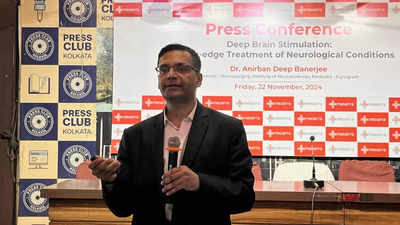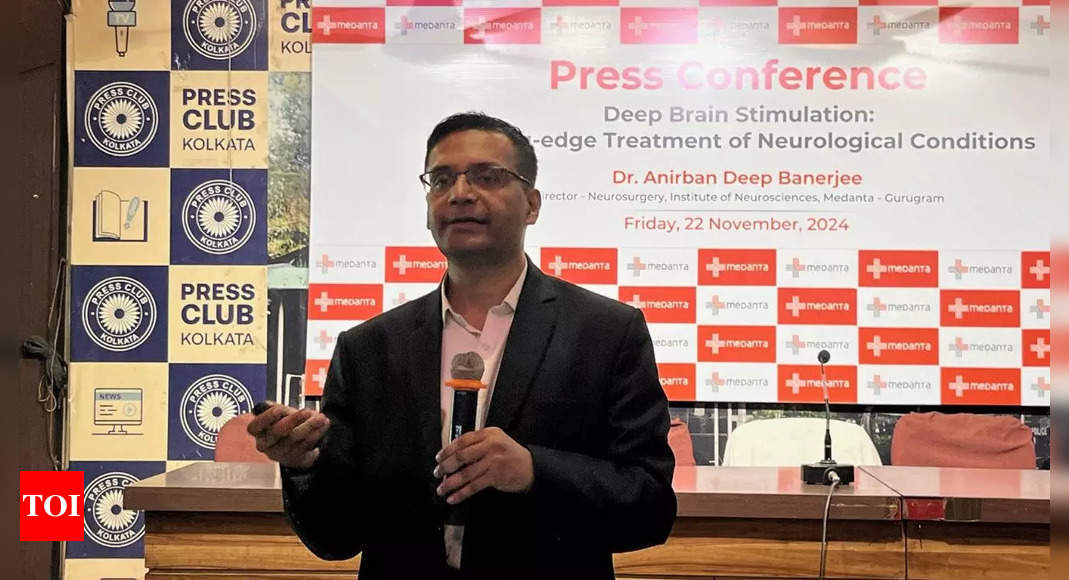
KOLKATA: Two patients in their 60s from Kolkata – one with Parkinson’s and the other with cervical dystonia – got their movement back on track, thanks to a cutting-edge neurological intervention at a Gurugram hospital by a doctor from Bengal. The two have reclaimed their lives from the clutches of progressive neurological conditions.
Parkinson’s threatened a grinding halt for retired bank official Kajal Baran Majumdar.
Assembly Election Results
The disease stalled the senior citizen’s early morning walks, rendering his spine bent and affecting his mobility almost completely.
For Ashok Kumar Sen, it started when he was around 50, experiencing shaking of hands and jerking of his neck uncontrollably. The progressive cervical dystonia left his neck almost permanently and painfully twisted at 90 degrees for a decade.
Deep Brain Stimulation (DBS), a cutting-edge neurostimulation procedure at Medanta Gurugram by Dr Anirban Deep Banerjee, came to the rescue of both patients.
According to Dr Banerjee, Director of Neurosurgery at the Institute of Neurosciences of the Gurugram Hospital, DBS or Brain Pacemaker Surgery is a transformative therapy wherein electrodes are implanted in specific affected areas of the brain to regulate abnormal signals, restoring motor function and greatly enhancing quality of life. It is known to bring relief to advanced-stage symptoms of Parkinson’s Disease, dystonia, epilepsy (adult onset), essential tremor, and obsessive-compulsive disorder (OCD).
“Neurological conditions are now one of the leading causes of disability worldwide. In India, they account for about 10% of the total disease burden. While we have recognised effective, advanced treatments like DBS to help transform lives, as in the case of Mr Majumdar, access remains a significant challenge. This is especially so in low- and middle-income countries. At Medanta, we are committed to improving access to state-of-the-art interventions like DBS and helping patients regain quality of life when medicines and other conventional treatments can no longer manage symptoms,” said Dr Banerjee.
Sharing his experience, Majumdar said, “Advancing Parkinson’s Disease left my spine bent, and I was about to become completely immobile. Then I remembered how DBS treatment at Medanta changed the life of my friend and colleague Ashok Kumar Sen. After Dr Anirban Deep Banerjee did my surgery, my symptoms improved within a few weeks. Now, with quarterly tuning of the brain pacemaker by Dr Banerjee, my symptoms are under control. I am able to sign papers, enjoy long walks, and family holidays.”
Sen said that he was agonised with the pain and experienced a loss of dignity due to his condition. He was also on botox therapy and medication before he underwent DBS. After the procedure, his head position returned near normal, and the pain subsided completely. He is now medication-free and leading a healthier life, with symptoms well-managed through periodic tuning of brain signals done by Dr Banerjee at Medanta’s monthly neurosurgery OPD in Kolkata.
“I met Dr Anirban Deep Banerjee, and the rest is history,” said Sen.
Dr Banerjee, who began performing DBS procedures in a Kolkata hospital more than a decade ago, has performed over 200 such procedures after he moved to the Gurugram Hospital.


